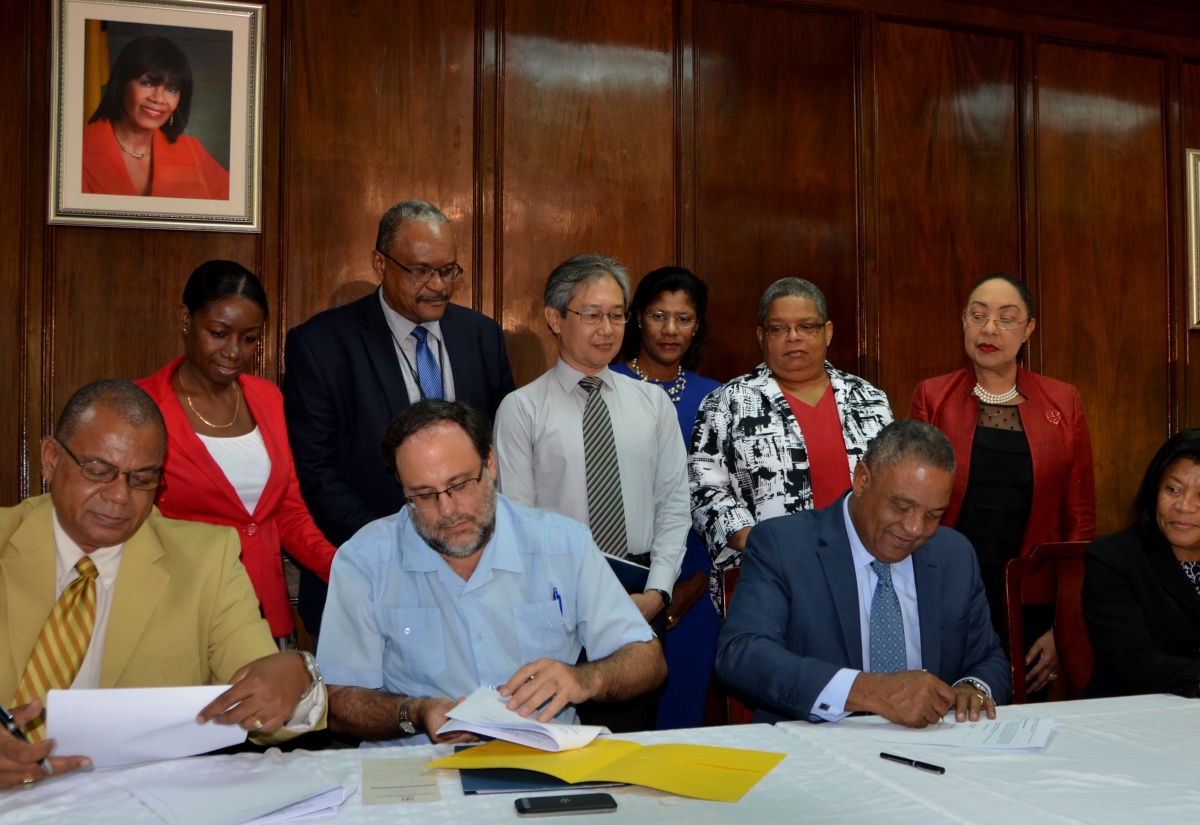MOU Signed For Effective Operation of Drug Treatment Programme
By: , November 25, 2015The Key Point:
The Facts
- Justice Minister, Senator the Hon. Mark Golding, said the MoU recommits the NCDA and the Ministries to contributing the various inputs required to ensure the sustainability of the programme, which facilitates the treatment and rehabilitation of persons, who commit minor offences, as a result of a drug abuse problem.
- The programme, established in 2001 under the Drug Court (Treatment and Offenders) Act, provides a structured and supervised treatment programme prescribed by the Drug Court.
The Full Story
The Ministries of Justice, National Security and Health, along with the National Council on Drug Abuse (NCDA), have signed a Memorandum of Understanding (MoU) to clarify and expand their responsibilities for the operation of the Drug Treatment Courts (DTCs).
Justice Minister, Senator the Hon. Mark Golding, said the MoU recommits the NCDA and the Ministries to contributing the various inputs required to ensure the sustainability of the programme, which facilitates the treatment and rehabilitation of persons, who commit minor offences, as a result of a drug abuse problem.
“The MoU provides clarity of the respective roles that each will play in the programme, which will promote accountability in the performance of these commitments,” he said.
He was speaking at the signing ceremony today (November 24) at the Ministry of Justice offices at the NCB Towers in Kingston.
The programme, established in 2001 under the Drug Court (Treatment and Offenders) Act, provides a structured and supervised treatment programme prescribed by the Drug Court.
By December 2014, approximately 887 persons in the pilot parishes of Kingston and St. James had been referred by the courts to the programme.
Senator Golding said the judicial system benefits from the programme, by reducing the number of offences committed due to drug abuse, while the correctional services system benefits from a fall in the penal population and associated costs and there is a reduction in medical treatment costs for the health sector.
“The single biggest benefit, however, has been to the lives of individuals (by) improving participants’ health and well-being, reducing recidivism (and) encouraging social inclusion and reintegration. This type of rehabilitation provides healing and discourages further illicit substance use,” he said.
National Security Minister, Hon. Peter Bunting, in his remarks at the signing ceremony, said the operation of the programme reflects the relatively progressive stance that Jamaica has taken with respect to drug addiction over the years.
“I think the approach is correct and if we stick with it, we will (continue to see) the benefits,” he said.
Under the MoU, the Ministry of Justice, in collaboration with the Chief Justice and through the Court Management Services, will provide policy direction and support to the implementation of the DTCs; facilitate the early assignment of defence counsel for eligible clients; provide initial screening of court cases by a Resident Magistrate; and establish a special calendar for Drug Court cases to be assigned on an individual basis to the same judge, to ensure continuity of supervision, among other responsibilities.
The Ministry of Health’s responsibilities include providing policy direction, maintenance services, clinical and administrative support for the operation of the DTCs and ensuring the assignment of psychiatrists to each site, who will provide the Court with requisite clinical assessment of the offender.
The Ministry of National Security is to provide probation officers to facilitate the rehabilitation of the drug abusers engaged in the programme, provide social enquiry and other related reports, as well as provide police personnel for each DTC location.
The NCDA, meanwhile, has the responsibility for the employment, payment, training and supervision of Drug Abuse Counsellors, and in collaboration with the Ministry of Health, facilitates continuous review of the treatment manual regarding the management of patients.
NCDA Executive Director, Michael Tucker, informed that counsellors have already been identified for the treatment sites and that these individuals are willing and able to deal with all the clients who are sent through the system.
“As a national council, we are excited about the signing of this MoU and the way forward. We know that all Ministries that are present here have to work together to ensure that the delivery of service is maintained and that clients get the best opportunity for recovery,” he said.
In addition to the Kingston Drug Treatment and Rehabilitation Centre and the Montego Bay Drug Treatment Court Programme, two other facilities were also established in 2014, one in Portmore, St. Catherine, and another in St. Thomas.


